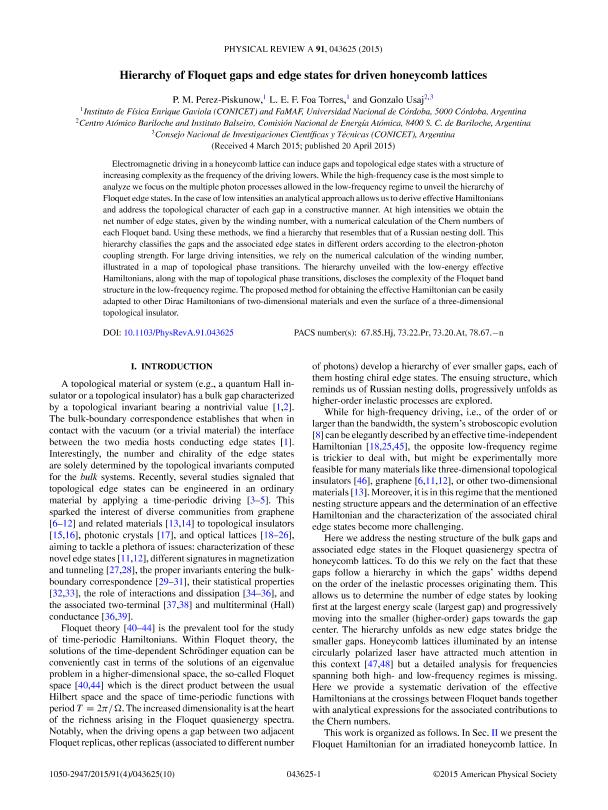Mostrar el registro sencillo del ítem
dc.contributor.author
Pérez Piskunow, Pablo Matías

dc.contributor.author
Foa Torres, Luis Eduardo Francisco

dc.contributor.author
Usaj, Gonzalo

dc.date.available
2018-05-04T20:48:32Z
dc.date.issued
2015-04-20
dc.identifier.citation
Pérez Piskunow, Pablo Matías; Foa Torres, Luis Eduardo Francisco; Usaj, Gonzalo; Hierarchy of Floquet gaps and edge states for driven honeycomb lattices; American Physical Society; Physical Review A: Atomic, Molecular and Optical Physics; 91; 4; 20-4-2015; 43625-1 / 43625-10
dc.identifier.issn
1050-2947
dc.identifier.uri
http://hdl.handle.net/11336/44226
dc.description.abstract
Electromagnetic driving in a honeycomb lattice can induce gaps and topological edge states with a structure of increasing complexity as the frequency of the driving lowers. While the high frequency case is the most simple to analyze we focus on the multiple photon processes allowed in the low frequency regime to unveil the hierarchy of Floquet edge-states. In the case of low intensities an analytical approach allows us to derive effective Hamiltonians and address the topological character of each gap in a constructive manner. At high intensities we obtain the net number of edge states, given by the winding number, with a numerical calculation of the Chern numbers of each Floquet band. Using these methods, we find a hierarchy that resembles that of a Russian nesting doll. This hierarchy classifies the gaps and the associated edge states in different orders according to the electron-photon coupling strength. For large driving intensities, we rely on the numerical calculation of the winding number, illustrated in a map of topological phase transitions. The hierarchy unveiled with the low energy effective Hamiltonians, alongside with the map of topological phase transitions discloses the complexity of the Floquet band structure in the low frequency regime. The proposed method for obtaining the effective Hamiltonian can be easily adapted to other Dirac Hamiltonians of two dimensional materials and even the surface of a 3D topological insulator.
dc.format
application/pdf
dc.language.iso
eng
dc.publisher
American Physical Society

dc.rights
info:eu-repo/semantics/openAccess
dc.rights.uri
https://creativecommons.org/licenses/by-nc-sa/2.5/ar/
dc.subject
Driven Quantum Systems
dc.subject
Floquet Topological Insulators
dc.subject
Graphene
dc.subject.classification
Astronomía

dc.subject.classification
Ciencias Físicas

dc.subject.classification
CIENCIAS NATURALES Y EXACTAS

dc.title
Hierarchy of Floquet gaps and edge states for driven honeycomb lattices
dc.type
info:eu-repo/semantics/article
dc.type
info:ar-repo/semantics/artículo
dc.type
info:eu-repo/semantics/publishedVersion
dc.date.updated
2018-04-09T16:53:36Z
dc.journal.volume
91
dc.journal.number
4
dc.journal.pagination
43625-1 / 43625-10
dc.journal.pais
Estados Unidos

dc.journal.ciudad
Nueva York
dc.description.fil
Fil: Pérez Piskunow, Pablo Matías. Consejo Nacional de Investigaciones Científicas y Técnicas. Centro Científico Tecnológico Conicet - Córdoba. Instituto de Física Enrique Gaviola. Universidad Nacional de Córdoba. Instituto de Física Enrique Gaviola; Argentina
dc.description.fil
Fil: Foa Torres, Luis Eduardo Francisco. Consejo Nacional de Investigaciones Científicas y Técnicas. Centro Científico Tecnológico Conicet - Córdoba. Instituto de Física Enrique Gaviola. Universidad Nacional de Córdoba. Instituto de Física Enrique Gaviola; Argentina
dc.description.fil
Fil: Usaj, Gonzalo. Consejo Nacional de Investigaciones Científicas y Técnicas; Argentina. Comisión Nacional de Energía Atómica. Gerencia del Área de Energía Nuclear. Instituto Balseiro; Argentina
dc.journal.title
Physical Review A: Atomic, Molecular and Optical Physics

dc.relation.alternativeid
info:eu-repo/semantics/altIdentifier/doi/http://dx.doi.org/10.1103/PhysRevA.91.043625
dc.relation.alternativeid
info:eu-repo/semantics/altIdentifier/url/https://journals.aps.org/pra/abstract/10.1103/PhysRevA.91.043625
Archivos asociados
